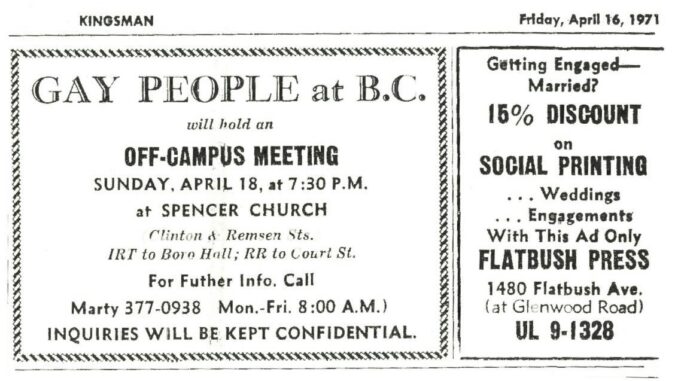
By Serena Edwards and Mars Marte
The LGBTQ+ Resource Center marked its 10th anniversary on Tuesday, Oct. 8 with a panel of speakers commemorating the history of the Center at Brooklyn College.
To celebrate the milestone, the Center’s director, Kelly Spivey, hosted a roundtable discussion rooted in the Center’s history and its hopes for the future. This panel offered a wide variety of stories from both current faculty and alumni who all united in their pursuit for cultivating queer community.
A majority of the panelists were current staff at BC, including Maria Scharron-Del Rio (they/them), the Dean of Education at Brooklyn College, Wayne Reid (he/him), a faculty member in School of Education, David McKay (he/him), a professor in the English Department, and Alex Juhasz (she/her), a professor in the Film Department. Former members who aided in the cultivation of the Center included Audrey Sheperd (he/him), the former president of LGBTQ+ Resource Center, and Charlie Herb (she/her), a BC alumni and a transgender woman who fought for transgender rights on campus. The speakers discussed their time at BC and the immense changes that the Center brought to campus over the years.
Reid recollected his experiences as a gay man at BC regarding the lack of a welcoming environment for queers on campus, a feeling many of the other speakers at the event shared. Reid sought to rectify the issue by expanding the type of events and guest speakers on campus.
“We started inviting queer artists to the education department events so that we can expose people to the queer community,” he said.
As a result of the Center’s gradual efforts, they eventually started an organization called “Proud Educators”: an organization that supports LGBTQ+ faculty in school by providing a safe space for faculty and students.
Herb spoke about how she influenced a lot of the transgender policies on campus and introduced the idea of gender neutral bathrooms. She created a 10-year plan on what changes should be implemented in the schools, and constantly pushed the envelope to create an environment for future students that echoed the one she dreamed of during her time at BC.
During Herb’s time at BC, there was not a lot of support for the transgender community. Due to lack of regulations, Herb’s quest to update her gender and name on record was stalled. However, Herb’s resilience took over, and she was willing to work with the school to figure out how to update it. At the time, the LGBTQA club and students minoring in LGBTQ Studies had little to no recognition.
“The LGBTA had the minimum budget to still be a club,” Herb explained, noting that during her time minoring in LGBTQ studies there were only three students. “I wanted to build the resources I thought I was going to have when I got here.”
Scharron-Del Rio spoke about her time at BC, their upbringing in Puerto Rico, and how this difference influenced their experiences. They expressed the challenges they faced regarding receiving acceptance from their community back in Puerto Rico. This hope, however, never came to fruition, causing Scharron-Del Rio to leave the island and locate to Brooklyn.
“One of the reasons I left Puerto Rico was because my first girlfriend did not want to come out to her family, and I wanted a community,” they explained. With the inability to live authentically, Scharron-Del Rio came to BC in the hopes of finding a space to freely explore their individuality, and they continue to explore their identity within an uplifting community. Now in an environment where they feel safe to explore themselves, Scharron-Del Rio was able to uncover hidden depths within themself. “I came out to gender queer, to myself, while I was here at Brooklyn College,” they said.
The conversation then pivoted to Juhasz, who explained how she navigated her queer identity as a lesbian along with being a professor, and the steps she took to start a family without discrimination. She ensured that she surrounded her family with accepting and open environments, and sought out those who reflected her family dynamics, not just with being lesbian, but also being an interracial family.
“My environment didn’t affect my family because I made sure to choose an environment that was similar to me with people that looked like me,” she said. “Being in this community has been a core focus for how I live and who I wanna be with, as well as what I study and what I teach.”
McKay, who was the original director of the Center, reflected upon his time at Brooklyn College and the evolution of the Center. He spoke about how he volunteered for the role of director and the difficulties the Center faced in the beginning. “We moved into a small room in Ingersoll where the students couldn’t even move around,” he said.
Spivey continued along the thread of the history of the Center. In the 1970s, there was a club called “Gay people at BC,” and then a counter-club, “You’re Not Queer,” was created as a response to show hatred towards the community.
“People were putting out negative information to students saying you’re not queer, this is a hoax,” she said. “They used hatred to spread the word. Underneath the “You’re not queer” flyers, you would see the flyers of “Gay people at BC.”
Every step since then has been to curate an accepting environment for LGBTQ+ students and faculty on campus. But the work doesn’t stop there, the panelists encouraged students to continue to push the envelope.
“You don’t need to settle for what we made for you all,” said Herb. “You can keep asking for more and making even greater things.”
